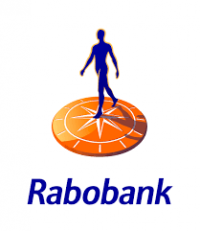Difference between revisions of "Rabobank"
| Line 13: | Line 13: | ||
|imagestyle = | |imagestyle = | ||
|captionstyle = | |captionstyle = | ||
|image = [[File: | |image = [[File:Bijdrijfs Logo.png|200px|alt=Bedrijf Logo]] | ||
|caption = | |caption = | ||
Revision as of 17:47, 8 December 2021
Coöperatieve Rabobank U.A, stylized as Rabobank, is a Dutch multinational banking and financial service company leading in food and agriculture financing. It also is a big investor in mortages and real estate in the Netherlands. It started as as a cooperation of small creditbanks for farmers. After the Coöperatieve Centrale Raiffeisen-Bank and the Coöperatieve Centrale Boerenleenbank merged in 1972 it became the Coöperatieve Centrale Raiffeissen-Boerenleenbank B.A., or Rabobank. In 2016 local branches of the Rabobank and Rabobank Nederland fused under the name Coöperatieve Rabobank U.A.. It has 520 locations in the Netherlands and about 8,8 million customers in the Netherlands plus 0,7 worldwide. The bank is active in 39 countries and has various subsidiadies.
Company Structure
Board of Directors
- Wiebe Draijer (chair)
- Bas Brouwers
- Els de Groot
- Kirsten Konst
- Bart Leurs
- Mariëlle Lichtenberg
- Berry Marttin
- Janine Vos
Commissioners
- Marjan Trompetter (chair)
- Gert-Jan van den Akker
- Arian Kamp
- Jan Nooitgedagt
- Petri Hofsté
- Pascal Visée
- Annet Aris
- Mark Pensaert
Accountant
Accountant van het bedrijf
Operations
Rabobank is a cooperative bank, which means they don’t have shareholders but members. Currently it consists of six governing bodies. The General Members Council consists of member representatives (the chairs of the local Supervisory Boards) and is considered as the highest governing body. It approves decisions made by the Board of Directors and Comissioners.
Paris Agreement to Today
beschrijving van wat het bedrijf heet gedaan en misdaan sinds het akkoord van Parijs
Current Policies and Emissions
Beschrijving van de uitstoot van het bedrijf en eventuele beleid
Climate Plans
In their 2020 rapport on climate change Rabobank claims to commit to the goals of the Paris agreement and that it will adjust their policies to help keep global warming under 2 degrees Celsius.
By 2023 Rabobank claims to have reduced the emissions of their own operations by 20% per FTE compared to 2018, which is 40% in absolute terms. Rabobank claims to have been climate neutral with regard to their own operations since 2007, partially by compensation emissions though purchasing Gold Standard certified CO2 credits.
According to Rabobank an important part of their climate change policies concerns their mortgage portfolio. The bank has set the goal to achieve an average energy label of B for all their mortages by 2024 but has not set a specific Co2 emission reduction as a target.
Another important portfolio for the Rabobank is food and agribusiness. Rabobank supports the goal set by the Dutch Climate agreement of cutting emissions with 6Mton by 2030. It has not set any specific emission targets for their own food and agribusiness portfolio. At the moment the bank is involved in setting up Banking for Impact on Climate in Agriculture (B4ICA). This group of banks, scientists and relevant experts is set up to develop a strategy to address data gaps with regard to assessing climate impact in agribusiness. Specifically it will help estimate the carbon footprint of individual farmers and agriculture subsectors and set targets for various climate scenarios.
Conclusion
Beschrijving of de plannen in lijn zijn met 'Parijs'
Bedrijfsspecifieke Passage in 'de brief'
SOWIESO
U heeft uw duurzaamheidsbeleid vastgelegd in [opsomming stukken].
INDIEN ER DOELEN ZIJN
Wij constateren dat uw ambitie is om [doelen van het bedrijf over alle emissies]. Het is duidelijk dat u daarmee 1 niet binnen een gezond pad van anderhalve graden blijft OF niet transparant/duidelijk/ of als deze ambitie gehaald wordt dat u daarmee binnen uw budget binnen een anderhalve graden scenario blijft.
INDIEN ER GEEN DOELEN ZIJN
Wij constateren dat u geen ambities heeft gesteld om de emissies uit uw hele waardeketen binnen de anderhalve graden te brengen.
INDIEN VAN TOEPASSING
In uw plannen blijkt niet goed u uw ambities gaat realiseren. Dat is een grote tekortkoming en dat maakt de ambitie niet geloofwaardig.
SOWIESO
Daarmee draagt uw bedrijf bij aan gevaarlijke klimaatverandering en loopt u het materiële risico om mensenrechtenschendingen te veroorzaken.
